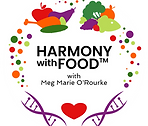Probiotics, prebiotics, postbiotics, and psychobiotics: What is the difference?
- Meg O'Rourke
- Nov 1, 2023
- 3 min read
In this week's episode of the Harmony With Food Radio Show, I'm talking about prebiotics, probiotics, postbiotics, and psychobiotics. You'll find out what the difference is between them, how they work, and how to find the best ones.
What is the microbiome?
The microbiome consists mostly of living organisms such as bacteria, viruses, and fungi. It is found throughout your body, but most of these microorganisms, particularly bacteria, reside in your intestines. That is referred to as the gut microbiome.
The microbiome plays many important roles in bodily functions, from stimulating the immune system to nutrient absorption to helping with anxiety, depression, blood pressure, and cholesterol. Every individual has a unique makeup of microorganisms that are affected by factors like lifestyle, diet, and medications.
Researchers are finding that some strains of bacteria can help with mental health, cardiovascular disease, and more. On the other hand, if you have more "bad" bacteria than good in your microbiome, it can contribute to things like GI issues, weight loss resistance, and autoimmune disease.
What are prebiotics?
Prebiotics are a group of nutrients that are broken down by the bacteria in your gut and then turned into short-chain fatty acids through fermentation. These acids help you digest food better, absorb micronutrients more efficiently, and promote good bacteria. If you think of this process like a factory, the prebiotics are the fuel that keeps it running.
What are the best sources of prebiotics?
Prebiotics occur naturally in many plant-based foods, including:
Asparagus
Artichokes
Bananas
Barley
Chickpeas
Garlic
Leeks
Oats
Onions
They may also be added to probiotics in the form of inulin and oligosaccharides.

What are probiotics?
Probiotics are defined as the living organisms that when administered in adequate amounts confer a health benefit on the host. If we think about the factory analogy again, probiotics act as workers in the factory producing beneficial metabolites.
Probiotics consist of different live microorganisms including bacteria, fungi, and yeast, and can have different effects.
What are the best probiotics?
Like prebiotics, there are many foods that have probiotics naturally in them, including:
Yogurt
Kefir
Kombucha
Sourdough bread
Sauerkraut
Kimchi
Pickles
Of course, there are also many probiotic supplements on the market, but they aren't all equally effective. Plus, if you're guessing which probiotic would work for you, you may choose the wrong one and see no benefits. That's why I always recommend testing. I offer microbiome testing that allows me to look at the bacteria in your gut and the amount of each type so that I can then figure out exactly what probiotic will work best for you.
If you're interested in learning more about testing, click below to schedule a free 45-minute call with me.
What are Postbiotics?
Probiotics are a preparation of microorganisms and their components that confer a health benefit onto the host. They are very similar to probiotics, but probiotics consist of living microorganisms and postbiotics are non-living. Postbiotics can also contain nutrients like vitamins B and K, as well as substrates that slow down the growth of bad bacteria.
Studies show that postbiotics can help maintain a healthy digestive system and support immune health. Postbiotics are found in supplements, fermented foods, or foods that are fortified with them.
What are psychobiotics?
Psychobiotics are specific probiotics that have been found to increase calming hormones, like dopamine, GABA, and serotonin. Research has shown that healing a leaky gut can go a long way to improving mood, and we know that food affects mood. This is a really exciting area of study as more psychiatrists start using psychobiotics to treat their patients.
Probiotics May Help Lower Blood Pressure
It is estimated that 40% of the global adult population has high blood pressure or hypertension, which puts people at risk of cardiovascular disease and other dangerous conditions. Recent studies show that probiotics may offer a protective effect on regulating blood pressure while reshaping the microbiome. In a recent study, researchers tracked how probiotics altered the gut microbial mix of mice over the course of 16 weeks. They found that both probiotics and probiotic fermented foods had an antihypertensive effect and found the two most effective strains.





.png)























Comments